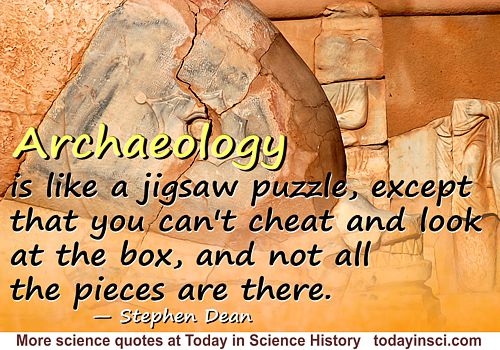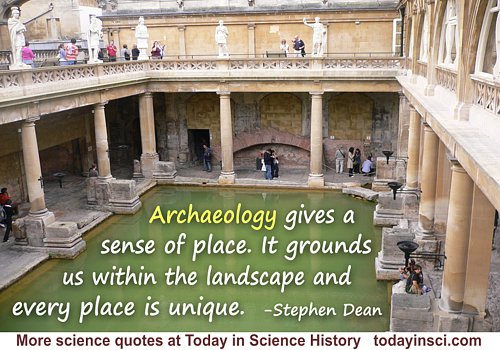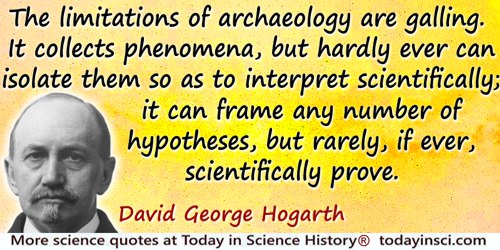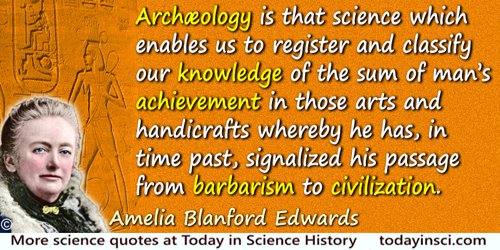Archaeology Quotes (51 quotes)
Archeology Quotes
Archeology Quotes
“Archaeology is made up entirely of anomalies,” said Terrence, “rearranged to make them fit in a fluky pattern. There'd be no system to it otherwise.”
Continued on Next Rock (1970). Quoted in Gary Westfahl, Science Fiction Quotations (2005), 321
[The attitude of the Renaissance towards the antique world was that] Archaeology to them was not a mere science for the antiquarian; it was a means by which they could touch the dry dust of antiquity into the very breath and beauty of life, and fill with the new wine of romanticism forms that else had been old and out-worn.
In his essay 'The Truth of Masks', collected in Intentions (1904), 213.
Indiana Jones: Archaeology is the search for fact… not truth. If it’s truth you're looking for, Dr. Tyree’s philosophy class is right down the hall. … So forget any ideas you've got about lost cities, exotic travel, and digging up the world. We do not follow maps to buried treasure, and “X” never, ever marks the spot. Seventy percent of all archaeology is done in the library. Research. Reading.
Spoken by actor Harrison Ford as character Indiana Jones in movie, Indiana Jones and the Last Crusade (1989).
Quand le sol aura été interrogé, il répondra.
When the soil has been questioned, it will answer.
When the soil has been questioned, it will answer.
From La Seine-Inférieure Historique et Archéologique: Époques Gauloise, Romaine et Franque (1866), 388. Used as epigraph in Mortimer Wheeler, Archaeology from the Earth (1954), xii. English by Webmaster using Google translate.
A man who has once looked with the archaeological eye will never see quite normally. He will be wounded by what other men call trifles. It is possible to refine the sense of time until an old shoe in the bunch grass or a pile of nineteenth century beer bottles in an abandoned mining town tolls in one’s head like a hall clock.
The Night Country (1971), 81.
American archaeology has always attracted lots of amateurs ... They were digging up Indian pottery all over the place.
From Robert S. Grumet, 'An Interview with Anthony F. C. Wallace', Ethnohistory (Winter 1998), 45, No. 1, 109.
Archaeology … is the Peeping Tom of the sciences. It is the sand-box of men who care not where they are going; they merely want to know where everybody else has been.
In syndicated column, published for example, as 'Trainer-Plane builder Turns Archaeologist', St. Petersburg Independent (15 Mar 1961), 5A. Also seen cited as 'Sifting the Sea for Time’s Treasures', NY Journal-American (14 Mar 1961). The story is about Ed Link who made his fortune inventing the Link Trainer, a flight simulator for pilots, then retired and turned his interests to underwater archaeology.
Archaeology gives a sense of place. It grounds us within the landscape and every place is unique. … Archaeology can also give an understanding of where we come from.
From interview with Sarah Marsh, in “Being a Council Archaeologist is ‘Like Being a Detective’”, The Guardian (6 Sep 2013).
Archaeology is not a science, it’s a vendetta.
As quoted, without citation, by Peter Hopkirk in Foreign Devils on the Silk Road, The Search for the Lost Treasures of Central Asia (1980, 1984), 170.
Archaeology is the science of digging in the earth to try and find a civilization worse than ours.
In Evan Esar, 20,000 Quips & Quotes (1968, 1995), 40.
Archaeology is the science that proves you can’t keep a good man down.
In Bob Phillips, Phillips' Book of Great Thoughts & Funny Sayings (1993), 24.
Archaeology is the science that proves you can't keep a good man down.
In Bob Phillips, Phillips' Book of Great Thoughts and Funny Sayings (1993), 25
Babylon the great is fallen, is fallen.
— Bible
(circa 325 A.D.)
By means of the Mummy, mankind, it is said,
Attests to the gods its respect for the dead.
We plunder his tomb, be he sinner or saint,
Distill him for physic and grind him for paint,
Exhibit for money his poor, shrunken frame,
And with levity flock to the scene of the shame.
O, tell me, ye gods, for the use of my rhyme:
For respecting the dead what’s the limit of time?
Attests to the gods its respect for the dead.
We plunder his tomb, be he sinner or saint,
Distill him for physic and grind him for paint,
Exhibit for money his poor, shrunken frame,
And with levity flock to the scene of the shame.
O, tell me, ye gods, for the use of my rhyme:
For respecting the dead what’s the limit of time?
Dead archaeology is the driest dust that blows.
In Archaeology from the Earth (1954), Preface, v.
Every great anthropologic and paleontologic discovery fits into its proper place, enabling us gradually to fill out, one after another, the great branching lines of human ascent and to connect with the branches definite phases of industry and art. This gives us a double means of interpretation, archaeological and anatomical. While many branches and links in the chain remain to be discovered, we are now in a position to predict with great confidence not only what the various branches will be like but where they are most like to be found.
In Henry Fairfield Osborn, 'Osborn States the Case For Evolution', New York Times (12 Jul 1925), XX1
Gold once out of the earth is no more due unto it; what was unreasonably committed to the ground, is reasonably resumed from it; let monuments and rich fabrics, not riches, adorn men’s ashes.
I’m not an historian but I can get interested—obsessively interested—with any aspect of the past, whether it’s palaeontology or archaeology or the very recent past.
Interview with Robert McCrum, in The Observer (26 Aug 2001).
If an ancient city survives to become a modern city, like Naples, its readability in archaeological terms is enormously reduced. It’s a paradox of archaeology: you read the past best in its moments of trauma.
As quoted in Doug Stewart, 'Resurrecting Pompeii', Smithsonian Magazine (Feb 2006)
If any layman were to ask a number of archaeologists to give, on the spur of the moment, a definition of archaeology, I suspect that such a person might find the answers rather confusing. He would, perhaps, sympathize with Socrates who, when he hoped to learn from the poets and artisans something about the arts they practised, was forced to go away with the conviction that, though they might themselves be able to accomplish something, they certainly could give no clear account to others of what they were trying to do.
Opening statement in lecture at Columbia University (8 Jan 1908), 'Archaeology'. Published by the Columbia University Press (1908).
If the finding of Coines, Medals, Urnes, and other Monuments of famous Persons, or Towns, or Utensils, be admitted for unquestionable Proofs, that such Persons or things have, in former Times, had a being, certainly those Petrifactions may be allowed to be of equal Validity and Evidence, that there have been formerly such Vegetables or Animals. These are truly Authentick Antiquity not to be counterfeited, the Stamps, and Impressions, and Characters of Nature that are beyond the Reach and Power of Humane Wit and Invention, and are true universal Characters legible to all rational Men.
Lectures and Discourses of Earthquakes (1668). In The Posthumous Works of Robert Hooke, containing his Cutlerian Lectures and other Discourses read at the Meetings of the Illustrious Royal Society (1705), 449.
In every branch of Natural Science progress is now so rapid that few accepted conclusions can be regarded as more than provisional; and this is especially true of prehistoric Archaeology.
In Ancient Hunters and Their Modern Representatives (1911), Preface, viii.
Leakey’s work on the Olduvai Canyon man has depended a great deal on the observance of a notched break in the shinbones of good-sized animals, which is assumed to have been made by striking a bone with a sharp rock before breaking it over the knee to expose the bone marrow which is edible and nourishing. When he found broken bones with the tell-tale notch, he knew that man must have been there and so began his search.
In 'Man’s Place in the Physical Universe', Bulletin of the Atomic Scientists (Sep 1965), 21, No. 7, 15.
Let not a monument give you or me hopes,
Since not a pinch of dust remains of Cheops.
Since not a pinch of dust remains of Cheops.
LORD CARNARVON: Can you see anything?
HOWARD CARTER: Yes, wonderful things.
HOWARD CARTER: Yes, wonderful things.
Howard Carter’s reply to Lord Carnarvon (George Herbert, 5th Earl of Carnarvon, 1866-1923) upon Carter's first entry to the tomb of Tutankhamen.
Marriage is an ancient institution and most of our knowledge of antiquity is gleaned from shattered pottery.
In Evan Esar, 20,000 Quips & Quotes (1968, 1995), 40.
May no rude hand deface it,
And its forlorn “Hic jacet!”
And its forlorn “Hic jacet!”
Last lines of poem 'Ellen Irwin, or the Braes of Kirtle', collected in The Poetical Works of William Wordsworth: Complete in One Volume (1828), 127. Note: The Latin words, “Hic jacet” mean “Here lies!”
https://books.google.com/books?id=Zi9ZNlSGBqoC
William Wordsworth - 1828 -
Men moralise among ruins.
My father, and the father of my father, pitched their tents here before me. … For twelve hundred years have the true believers—and, praise be to God! all true wisdom is with them alone—been settled in this country, and not one of them ever heard of a palace underground. Neither did they who went before them. But lo! here comes a Frank from many days’ journey off, and he walks up to the very place, and he takes a stick … and makes a line here, and makes a line there. Here, says he, is the palace; there, says he, is the gate; and he shows us what has been all our lives beneath our feet, without our having known anything about it. Wonderful! Wonderful! Is it by books, is it by magic, is it by your prophets, that you have learnt wisdom?
(c. 1850) To Austin Layard, the English archaeologist who discovered and excavated Nineveh and Nimrud, 1845-1861.
No excavation ought to ever be permitted except under the immediate eye of a responsible and trustworthy superintendent. ... Superfluous precision may be regarded as a fault on the right side. ... [P]ottery [i]s the human fossil, so widely is it distributed.
Some of the basic principals of digging he adopted.
Some of the basic principals of digging he adopted.
Excavations in Cranborne Chase. Quoted in Alice Beck, The Land of Prehistory: A Critical History of American Archaeology (1998), 62-63.
No other animals have ever lighted fires as far as we can tell. In field archeology, a charcoal deposit found in such a location that it could not have been made by a forest fire is taken as conclusive evidence of man. A circular dark disk in the soil five or six feet in diameter is such a find. … With … modern radioactive dating methods, we can trace man’s history.
In 'Man’s Place in the Physical Universe', Bulletin of the Atomic Scientists (Sep 1965), 21, No. 7, 15.
Not marble graven with public records, whereby breath and life return to goodly heroes after death.
— Horace
In Ode 8, 'In Praise of Poesy', Horace, The Odes and Epodes (1921), 315.
One of the most interesting parts is the detective element. Archaeology is like a jigsaw puzzle, except that you can't cheat and look at the box, and not all the pieces are there.
From interview with Sarah Marsh, in “Being a Council Archaeologist is ‘Like Being a Detective’”, The Guardian (6 Sep 2013).
Papyra, throned upon the banks of Nile,
Spread her smooth leaf, and waved her silver style.
The storied pyramid, the laurel’d bust,
The trophy’d arch had crumbled into dust;
The sacred symbol, and the epic song (Unknown the character, forgot the tongue,)
With each unconquer’d chief, or sainted maid,
Sunk undistinguish’d in Oblivion’s shade.
Sad o’er the scatter’d ruins Genius sigh’d,
And infant Arts but learn’d to lisp, and died.
Till to astonish’d realms Papyra taught To paint in mystic colours Sound and Thought,
With Wisdom’s voice to print the page sublime,
And mark in adamant the steps of Time.
Spread her smooth leaf, and waved her silver style.
The storied pyramid, the laurel’d bust,
The trophy’d arch had crumbled into dust;
The sacred symbol, and the epic song (Unknown the character, forgot the tongue,)
With each unconquer’d chief, or sainted maid,
Sunk undistinguish’d in Oblivion’s shade.
Sad o’er the scatter’d ruins Genius sigh’d,
And infant Arts but learn’d to lisp, and died.
Till to astonish’d realms Papyra taught To paint in mystic colours Sound and Thought,
With Wisdom’s voice to print the page sublime,
And mark in adamant the steps of Time.
Particle physics has become the archeology of physics.
In 'What's Wrong With Those Epochs', Physics Today (Nov 1990). Collected in Why Quark Rhymes with Pork: And Other Scientific Diversions (2016), 60.
Show me an archaeologist, and I'll show you a man who practices skull drugery.
In Bob Phillips, Phillips' Book of Great Thoughts & Funny Sayings (1993), 24.
Tedious as it may appear to some to dwell on the discovery of odds and ends that have, no doubt, been thrown away by the owner as rubbish ... yet it is by the study of such trivial details that Archaeology is mainly dependent for determining the date of earthworks. ... Next to coins fragments of pottery afford the most reliable of all evidence ... In my judgement, a fragment of pottery, if it throws light on the history of our own country and people, is of more interest to the scientific collector of evidence in England, than even a work of art and merit that is associated only with races that we are remotely connected with.
On the importance of pottery to an archaeologist.
On the importance of pottery to an archaeologist.
Excavations in Bokerly and Wansdyke, vol. 3, ix-30. Quoted in Cambridge Antiquarian Society, Proceedings (1895), vol. 8, 180.
The Egyptian mummies, which Cambyses or time hath spared, avarice now consumeth. Mummy is become merchandise, Mizraim cures wounds, and Pharaoh is sold for balsams.
The human mind has a natural tendency to explore what has passed in distant ages in scenes with which it is familiar: hence the taste for National and Local Antiquities. Geology gratifies a larger taste of this kind; it inquires into what may appropriately be termed the Antiquities of the Globe itself, and collects and deciphers what may be considered as the monuments and medals of its remoter eras.
Vindiciae Geologicae (1820), 6.
The limitations of archaeology are galling. It collects phenomena, but hardly ever can isolate them so as to interpret scientifically; it can frame any number of hypotheses, but rarely, if ever, scientifically prove.
In Times Literary Supplement (29 Dec 1921), 869, as cited in J.A. Macgillivray, Minotaur: Sir Arthur Evans and the Archaeology of the Minoan Myth (2000), 271.
The oldest empires,—what we called venerable antiquity, now that we have true measures of duration, show like creations of yesterday. … The old six thousand years of chronology become a kitchen clock,—no more a measure of time than an hour-glass or an egg-glass,—since the duration of geologic periods has come into view.
In 'Progress of Culture', an address read to the Phi Beta Kappa Society at Cambridge, 18 July 1867. Collected in Works of Ralph Waldo Emerson (1883), 475.
The subject-matter of Archaeology is threefold—the Oral, the Written and the Monumental.
In Lecture to the Oxford meeting of the Archaeological Institute (18 Jun 1850), printed in 'On the Study of Achaeology', Archaeological Journal (1851), 8, 2.
The threads that archaeology has put in Sir Arthur Evans’ hands are of necessity tangled, faded and broken; yet his learning and intuition have enabled him to weave them into a coherent whole that is almost history.
From Bosanquet’s book review, 'The Realm of Minos', (of Sir Arthur Evans’, The Palace of Minos: A Comparative Account of the Successive Stages of the Early Cretan Civilization as Illustrated by the Discoveries at Knossos: Volume I), in Harold Cox, ed., The Edinburgh Review (Jul 1922), 236, No. 481, 70.
To build up cities, an age is needed: but an hour destroys them.
Urbes constituit ætas: hora dissolvit.
Urbes constituit ætas: hora dissolvit.
Cited as from Quæstionum Naturalium, Book III. 27 in Kate Louise Roberts (ed.) Hoyt’s New Cyclopedia of Practical Quotations (1922), 798.
To find old sites, you must look in old dirt.
Epigraph, without citation, in David Hurst Thomas, Archaeology (1998), 205.
Were I asked to define it, I should reply that archæology is that science which enables us to register and classify our knowledge of the sum of man’s achievement in those arts and handicrafts whereby he has, in time past, signalized his passage from barbarism to civilization.
In Pharaohs, Fellahs and Explorers (1891), 24.
What marvel is this? We begged you for drinkable springs,
O earth, and what is your lap sending forth?
Is there life in the deeps as well? A race yet unknown
Hiding under the lava? Are they who had fled returning?
Come and see, Greeks; Romans, come! Ancient Pompeii Is found again, the city of Hercules rises!
O earth, and what is your lap sending forth?
Is there life in the deeps as well? A race yet unknown
Hiding under the lava? Are they who had fled returning?
Come and see, Greeks; Romans, come! Ancient Pompeii Is found again, the city of Hercules rises!
Translation as given, without citation, as epigraph in C.W. Ceram, Gods, Graves, and Scholars: The Story of Archaeology (1986), 1. There are other translations of the Schiller’s original German, for example, in 'Pompeii and Herculaneum', Life of Schiller: Poetical Works (1902), 249.
What strange wonder is this? Our prayer to thee was for water,
Earth! What is this that thou now send’st from thy womb in reply?
In the abyss is there life ? Or hidden under the lava
Dwelleth some race now unknown? Does what hath fled e’er return?
Greeks and Romans, oh come! Oh, see the ancient Pompeii
Here is discover’d again,—Hercules’ town is rebuilt!
Earth! What is this that thou now send’st from thy womb in reply?
In the abyss is there life ? Or hidden under the lava
Dwelleth some race now unknown? Does what hath fled e’er return?
Greeks and Romans, oh come! Oh, see the ancient Pompeii
Here is discover’d again,—Hercules’ town is rebuilt!
Beginning lines of poem, 'Pompeii and Herculaneum', in Edgar A. Bowring (trans.), The Poems of Schiller (1875), 237.
Wherever man has left the stamp of mind on brute-matter; whether we designate his work as structure, texture, or mixture, mechanical or chymical; whether the result be a house, a ship, a garment, a piece of glass, or a metallic implement, these memorials of economy and invention will always be worthy of the attention of the Archaeologist.
In Lecture to the Oxford meeting of the Archaeological Institute (18 Jun 1850), printed in 'On the Study of Achaeology', Archaeological Journal (1851), 8, No. 29, 25.
While stands the Coliseum, Rome shall stand;
When falls the Coliseum, Rome shall fall;
And when Rome falls—the world.
When falls the Coliseum, Rome shall fall;
And when Rome falls—the world.
Ye are like unto whited sepulchres, which indeed appear beautiful outward, but are within full of dead men’s bones, and of all uncleanness.
— Bible
(circa 325 A.D.)




 In science it often happens that scientists say, 'You know that's a really good argument; my position is mistaken,' and then they would actually change their minds and you never hear that old view from them again. They really do it. It doesn't happen as often as it should, because scientists are human and change is sometimes painful. But it happens every day. I cannot recall the last time something like that happened in politics or religion.
(1987) --
In science it often happens that scientists say, 'You know that's a really good argument; my position is mistaken,' and then they would actually change their minds and you never hear that old view from them again. They really do it. It doesn't happen as often as it should, because scientists are human and change is sometimes painful. But it happens every day. I cannot recall the last time something like that happened in politics or religion.
(1987) -- 


